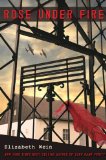
 Rose Under Fire
Rose Under FireReview posted September 20, 2013.
Hyperion, New York, September 2013. 346 pages.
Starred Review
Rose Under Fire is one of the Advance Reader Copies I was happiest about snagging at ALA Annual Conference, and one of the first ones I read. Rose Under Fire is listed as a "companion novel" to Code Name Verity, and you don't have to have read Code Name Verity to enjoy this novel. However, I recommend reading Code Name Verity first, for the simple reason that once you read Rose Under Fire, you'll know who lives and who dies in the earlier book.
Rose Under Fire doesn't have a killer plot twist like Code Name Verity. Although some of the characters we love appear, this is a very different book. It's still about World War II, but this one is a concentration camp book.
Now, I've read an awful lot of concentration camp books. (As a child, I read The Hiding Place, by Corrie ten Boom, which Elizabeth Wein said in an interview she also read as a child and got her obsessed with Holocaust stories.) It's not a cheery topic at all, and just when you think you know the story, this one comes along.
The fact is, Elizabeth Wein is a masterful writer. I love this book because I love the characters, which she makes come to life in her own unique way. This particular concentration camp book focuses on a group of Polish prisoners who underwent experimental surgery the Nazis performed on them and were then held at Ravensbrück.
But we start with a young American girl pilot name Rose Justice. She's helping out in England, not flying in combat zones, but transporting planes. But then when she gets a chance to take a plane to France, something goes wrong, and she ends up captured by Nazis and sent to Ravensbrück.
Rose is a poet, and her poems are worth bread to her fellow prisoners. And they find out each others' stories.
Here they are talking about how they came to Ravensbrück:
"I landed my plane in the wrong place," I said.
Róża snickered and leaped into the conversation. "I was arrested for being a Girl Scout. They arrested my whole Girl Scout troop in the summer of 1941. I was fourteen."
I gaped at her.
"We were delivering plastic explosive for bombs," she said. "You know, little homemade bombs to sabotage officials' cars and throw in office windows. Most of us got released, but they kept the oldest -- and I didn't stand a chance, because I'd actually been stopped at a checkpoint and, well, it was pretty obvious I was smuggling explosive. You know how it is when you're fourteen -- you think you're so much smarter than everybody else and nothing will ever hurt you. . . ." She trailed off, wiping her own bowl with her last crumb of bread, and then said in her offhand way, "They didn't beat me, but they made me watch while they beat my mother, trying to get me to tell them who I was working for. Lucky for me I didn't know. Someone always dropped off the stuff in our baskets with a note that said where to take it. They beat the crap out of our Girl Scout leader and then they shot her. So, 51498, what were you doing when you were fourteen?"
I think what made me love this book, once I'd gotten a little way in, was how richly the author draws the characters. They're distinctive and individual. And they're holding on to hope that one day they will let the world know what has happened.
